Values

 My niece, Ashley Parmely has been a part of our family since she married my nephew, Eric Parmely on July 23, 2011. Since that time, we have seen the many sides of Ashley. I’m not talking about personality sides, although there is that too, but really, it’s more about her capabilities. Ashley has grown as a person, of course, and she is a great mom. She and Eric have four children, Reagan, Hattie, Bowen, and Maeve. Ashley homeschools the older girls, while brother Bowen attends pre-school for one more year, at which time she will homeschool him too. Maeve is too little right now, but will go to pre-school next year.
My niece, Ashley Parmely has been a part of our family since she married my nephew, Eric Parmely on July 23, 2011. Since that time, we have seen the many sides of Ashley. I’m not talking about personality sides, although there is that too, but really, it’s more about her capabilities. Ashley has grown as a person, of course, and she is a great mom. She and Eric have four children, Reagan, Hattie, Bowen, and Maeve. Ashley homeschools the older girls, while brother Bowen attends pre-school for one more year, at which time she will homeschool him too. Maeve is too little right now, but will go to pre-school next year.
While you might think that homeschooling would give Ashley little bits of free time here and there, you would 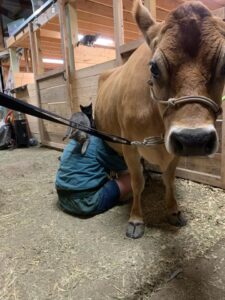
 be wrong. Ashley and Eric own a farm. but Eric also works full-time. That means that Ashley has the working of the farm and feeding the animals during the day…in addition to caring for her four children and making all necessary trips to town as the transport for the kids. Ashley is an accomplished equestrian, and a great teacher of the same. Her children are totally comfortable around horses, as well as all the other animals Ashley and Eric have on the farm.
be wrong. Ashley and Eric own a farm. but Eric also works full-time. That means that Ashley has the working of the farm and feeding the animals during the day…in addition to caring for her four children and making all necessary trips to town as the transport for the kids. Ashley is an accomplished equestrian, and a great teacher of the same. Her children are totally comfortable around horses, as well as all the other animals Ashley and Eric have on the farm.
Another side of Ashley that some people may never have seen, is her generous heart. It’s not that she doesn’t show her generous heart, because she does. It’s just that if you haven’t had a need, you might not have had first-hand knowledge of her generous heart. Ashley is the person who first thinks of bringing in a meal when it is needed. She is the one who invites family to her home for a meal once a month, to make sure we all stay close. She is a giver, often giving to people in need. She is a photographer, and her work always has a very special touch to it. I think it’s because Ashley always thinks about how she would feel about the project…how 
 she would want it to look. That is important when you are doing things for people. That is the heart of what Ashley is. When I think of Ashley, that is how she makes me feel. The heart she has for people is always on display. It is what makes her the beautiful person she is. Today is Ashley’s birthday. Happy birthday Ashley!! Have a great day!! We love you!!
she would want it to look. That is important when you are doing things for people. That is the heart of what Ashley is. When I think of Ashley, that is how she makes me feel. The heart she has for people is always on display. It is what makes her the beautiful person she is. Today is Ashley’s birthday. Happy birthday Ashley!! Have a great day!! We love you!!
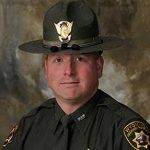
 I don’t think any of us could have foreseen the changes that would occur in ten short years of marriage. Jason Sawdon became my nephew when he married my niece Jessica Hadlock on August 18, 2012, in what they have dubbed “the most amazing, fun party celebrating love.” They have been celebrating ever since that day. When they got married, Jason was a patrolman for the Wyoming Highway Patrol. He still works for the Wyoming Highway Patrol, but in a different capacity these days. A little over a year ago, Jason was promoted to Sergeant of Equipment and Technology, in a change that unfortunately for the rest of the family, took his family from Casper to Cheyenne. So, in the next step in his decorated career, they moved to Cheyenne on June 5, 2021. It was hard for all of us to have them go, but it was the best thing for their family. Jason is no longer on the street, and his hours are much better for a family man. His girls need him home at night.
I don’t think any of us could have foreseen the changes that would occur in ten short years of marriage. Jason Sawdon became my nephew when he married my niece Jessica Hadlock on August 18, 2012, in what they have dubbed “the most amazing, fun party celebrating love.” They have been celebrating ever since that day. When they got married, Jason was a patrolman for the Wyoming Highway Patrol. He still works for the Wyoming Highway Patrol, but in a different capacity these days. A little over a year ago, Jason was promoted to Sergeant of Equipment and Technology, in a change that unfortunately for the rest of the family, took his family from Casper to Cheyenne. So, in the next step in his decorated career, they moved to Cheyenne on June 5, 2021. It was hard for all of us to have them go, but it was the best thing for their family. Jason is no longer on the street, and his hours are much better for a family man. His girls need him home at night.
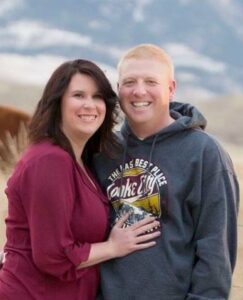
They have spent the last year exploring their new city, and enjoying their new house, which Jason spent a lot of time refreshing for them before they moved in. This past year brough some sadness, in that they lost Daisy, their sweet Boxer dog, but now they have adopted a new Boxer dog that they named Riley. She has been so great for their family, and she is Jason and Jessi’s daughter, Adelaide’s best friend…and for Jason and Jessi, that means everything. As far as they are concerned, their little daughter, Adelaide is the best thing that has ever happened to them, and we all agree. She has been such a blessing.
Jason is such a happy person. He has a great sense of humor and loves to tease, but Jason also has a heart of gold. I will never forget what he did for my mom after my dad had passed away. Her birthday was on January 1st, so we always had a party for her. She and my dad always had their special dance. With Dad gone, mom 
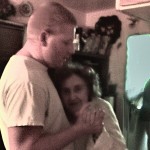 felt like “the forgotten dancer” until Jason took her out on the dance floor. She struggled to stand on her own, but he held her up, and she got her dance. That was the single most amazingly precious thing I have ever seen…and I will never forget his kindness to her. It meant the world to her. That is the essence of the kind of person Jason is…with everything and everyone. Anyone who has ever been on the receiving end of Jason’s kindness, knows just what I mean. Today is Jason’s birthday. Happy birthday Jason!! Have a great day!! We love you!!
felt like “the forgotten dancer” until Jason took her out on the dance floor. She struggled to stand on her own, but he held her up, and she got her dance. That was the single most amazingly precious thing I have ever seen…and I will never forget his kindness to her. It meant the world to her. That is the essence of the kind of person Jason is…with everything and everyone. Anyone who has ever been on the receiving end of Jason’s kindness, knows just what I mean. Today is Jason’s birthday. Happy birthday Jason!! Have a great day!! We love you!!
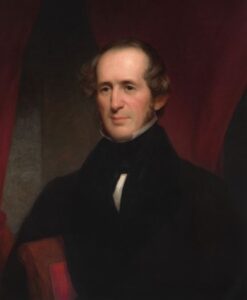
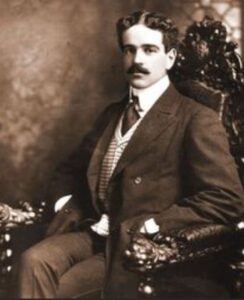 Like it or not, people are put into classes based on their income, and as we know, the elite are the very rich ones. Most people fall into the middle class, with a large group of people being in the poverty level. Many of the people in these classes spend their time working hard and sometimes living paycheck to paycheck, just trying to make ends meet. While those people are doing their best to survive, the very wealthy, also known as the Elite Class spend their time doing their very best to outdo each other. What a headache that must be.
Like it or not, people are put into classes based on their income, and as we know, the elite are the very rich ones. Most people fall into the middle class, with a large group of people being in the poverty level. Many of the people in these classes spend their time working hard and sometimes living paycheck to paycheck, just trying to make ends meet. While those people are doing their best to survive, the very wealthy, also known as the Elite Class spend their time doing their very best to outdo each other. What a headache that must be.
During the Gilded Age, the Elite Class was in a particularly fierce fight for supremacy, not in politics or world economy issues, but rather in extravagancy. The Gilded Age took place from the 1870s to about the 1900s. During that time the Elite Class was building great estates with elegantly designed homes…trying to outdo each other while most Americans and Europeans struggled just to make basic ends meet. The Gilded Age elite struggled with one another, competing over who had the biggest, the most, the best…of any and everything. Anything that was outlandish, wild, shocking, or just plain spendy, was fair game in their “struggle.” The biggest source of extravagance was in their homes. Newport, Rhode Island, was prime real estate for the 19th-century one-percenters. Cornelius Vanderbilt constructed his famous 
 home, The Breakers, it was an attempt to one-up his brother, William K Vanderbilt’s latest showplace, Marble House, designed and planned by William K Vanderbilt to “outstaff, outdress, and outparty” his brother and other Gilded Age gents.
home, The Breakers, it was an attempt to one-up his brother, William K Vanderbilt’s latest showplace, Marble House, designed and planned by William K Vanderbilt to “outstaff, outdress, and outparty” his brother and other Gilded Age gents.
The whole production among the elites grew so fierce that home construction was covered in the local newspapers…on a daily basis!! The Newport Mercury reported that Marble House had 500,000 cubic feet of imported marble, as well as paneled walls portraying gods from the Classical age. Some walls were even coated in 22-carat gold leaf, all of it painstakingly applied by hand…not William K’s hand mind you. The latter Vanderbilt couldn’t sully his hands with the work of the common man. That was what his money was for…to underpay the common worker to build the elaborate house.
Yes, the whole age really was ridiculously extreme, but there was actually an ancient precedent that the Gilded Age families simply followed. Just take a look at the surviving Roman villas, the Versailles palace in France, and 
 the Catherine Palace in Saint Petersburg, Russia. The rich and powerful have always felt compelled to put their wealth on display. They did it to show other powerful people that they could keep up with the rest, and to challenge them to take the game to the next level…a challenge they happily accepted. It was a wild time, and in many places around the world, the game continues.
the Catherine Palace in Saint Petersburg, Russia. The rich and powerful have always felt compelled to put their wealth on display. They did it to show other powerful people that they could keep up with the rest, and to challenge them to take the game to the next level…a challenge they happily accepted. It was a wild time, and in many places around the world, the game continues.
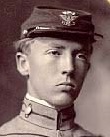
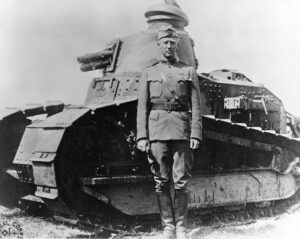 There are men of war, and then there are men of war. United States General George S Patton was the latter…meaning that he almost lived for war. Patton was a man who came from a long line of military people, and while he wasn’t always a tactful man, he was a great warrior…a fact that he proved over and over again. Many people didn’t like him much, but they couldn’t deny his capabilities. Patton was a great leader, but he wasn’t really a people person, and that got him in some trouble.
There are men of war, and then there are men of war. United States General George S Patton was the latter…meaning that he almost lived for war. Patton was a man who came from a long line of military people, and while he wasn’t always a tactful man, he was a great warrior…a fact that he proved over and over again. Many people didn’t like him much, but they couldn’t deny his capabilities. Patton was a great leader, but he wasn’t really a people person, and that got him in some trouble.
George Smith Patton Jr, who was born to George Smith Patton Sr and his wife, Ruth Wilson, the daughter of Benjamin Davis Wilson on November 11, 1885, in San Gabriel, California. Maybe because of his family history, or maybe it was just him, but Patton never seriously considered a career other than the military. At the age of seventeen he tried for an appointment to the United States Military Academy at West Point, New York. He also applied to several universities with Reserve Officer’s Training Corps programs, and was accepted to Princeton College, but eventually decided on Virginia Military Institute (VMI), which his father and grandfather had attended. Later, after studying at West Point, he served as a tank officer in World War I. Patton loved the tank, and his time as a tank officer, as well as his military strategy studies led him to become an advocate of the crucial importance of the tank in future warfare. When the United States entered World War II, Patton became the logical choice for the command of an important US tank division, and his division played a key role in the Allied invasion of French North Africa in 1942. Then, in 1943, in the Allied assault on Sicily, Patton and the US 7th Army in its assault on Sicily and won fame for out-commanding Montgomery during their pincer movement against Messina. Patton loved competition, and this was his chance to shine. On August 17, 1943, Patton and his 7th Army arrived in Messina several hours before British Field Marshal Bernard L Montgomery and his 8th Army, winning the unofficial “Race to Messina” and completing the Allied conquest of Sicily.
Although Patton was one of the most capable American commanders in World War II, he was also one of the most controversial. Patton was a “pull yourself up by your bootstraps” kind of guy, and therefore had no personal understanding of fear or fatigue. PTSD, battle fatigue, or shell shock were conditions he could not accept in anyone. In fact, they infuriated him so much that he actually slapped two soldiers who were suffering with the conditions. During the Sicilian campaign, Patton generated considerable controversy when he accused a hospitalized US soldier suffering from battle fatigue of cowardice and then personally struck him across the face. The famously profane general was forced to issue a public apology and was reprimanded by General Dwight Eisenhower. They would have liked to “walk away” from Patton, but when it came time for the invasion of Western Europe, Eisenhower couldn’t find a general as formidable as Patton, so, once again Patton was granted an important military post. In 1944, Patton commanded the US 3rd Army in the invasion of France. Then, in 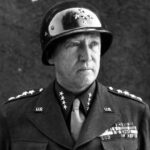
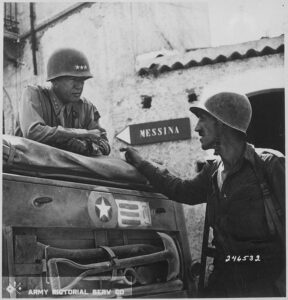 December of that year Patton’s great expertise in military movement and tank warfare helped to crush the German counteroffensive in the Ardennes.
December of that year Patton’s great expertise in military movement and tank warfare helped to crush the German counteroffensive in the Ardennes.
During one of his many successful campaigns, General Patton was said to have declared, “Compared to war, all other forms of human endeavor shrink to insignificance.” Patton died in a hospital in Germany on December 21, 1945, from injuries sustained in an automobile accident near Mannheim. He was just 60 years old.
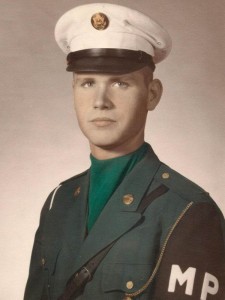
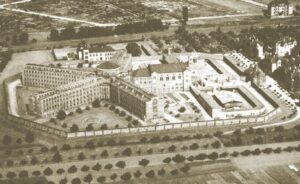 My brother-in-law, LJ Cook was an MP in the Army from 1968 to 1971, which was the Vietnam Era. For a long time, that was all I knew about his time of service. Today, that has all changed. I think I thought of MPs as maybe handling the disobedient military personnel, maybe like the movie, “Stripes” or the show, “MASH,” but movies rarely tell the whole story on these things. LJ went through basic training in Fort Ord, located in the Monterey Bay area of California. Following his basic training, LJ was sent to MP school at Fort Gordon located southwest of Atlanta, Georgia. Following his MP training, LJ flew into Frankfort, Germany, and then on to Mannheim, Germany, where he would spend the remainder of his military service as an MP at the Mannheim Prison.
My brother-in-law, LJ Cook was an MP in the Army from 1968 to 1971, which was the Vietnam Era. For a long time, that was all I knew about his time of service. Today, that has all changed. I think I thought of MPs as maybe handling the disobedient military personnel, maybe like the movie, “Stripes” or the show, “MASH,” but movies rarely tell the whole story on these things. LJ went through basic training in Fort Ord, located in the Monterey Bay area of California. Following his basic training, LJ was sent to MP school at Fort Gordon located southwest of Atlanta, Georgia. Following his MP training, LJ flew into Frankfort, Germany, and then on to Mannheim, Germany, where he would spend the remainder of his military service as an MP at the Mannheim Prison.
Construction on Mannheim Prison was started in 1905 and it first opened for use in 1909. It was a Third Reich prison until after World War II. Then it was used for United States military purposes during the Vietnam War. The prison included a separate hospital building, which until 1945 was used to treat ill prisoners throughout the region. The prison was considered modern for the time, with each cell having running water with a toilet and a washbasin, central heating and electric light. As with all prisons in Third Reich Germany, Mannheim Prison was used to incarcerate standard criminal convicts as well as political prisoners.
LJ was a Maximum Confinement Section Chief during his time at Mannheim Prison. The correctional officers lived in the barracks on site during their off time. LJ was part of the 77th MP Company, which at that time was the biggest company in army. The prison also had two chapels, two mess halls, and it was a large enough place that LJ didn’t know everyone stationed there…even after three years. When an MP first arrives at Mannheim Prison, they are settled into the squad bay in the attic of the barracks. This is really temporary housing until they can be officially assigned. Most of the rooms in the main barracks (specifically for the Non-NCO personnel) have four men to a barracks. The NCOs had two men to a room. And the higher-ranking officers had a private room. Lynn’s highest rank was that of Acting E7, but his permanent rank was Seargent. He could have been given the permanent rank of E7, if he had wanted to re-enlist for six more years. He did not. He would have also been sent to Vietnam had he re-enlisted.
During his time at Mannheim Prison, LJ saw three or four prison riots, all of which the MPs squashed. The prisoners at Mannheim Prison were American GIs in prison for everything from being AWOL to murder. Of course, riots happened when the prisoners overpowered a guard. That seems like an unlikely possibility, but the prison, with four blocks, A, B, C, and D, with each block having 8 cells, each holding 30 to 40 prisoners. Cells were made of steel bars so, no privacy. A guard was sometimes in the cell with the men, and you just didn’t take a gun in there, on the off chance that a prisoner could take it from you. The guards were armed with night sticks, as their only weapon. During the riots, while LJ was there, no guards were killed, but there were a number of incidences in which guards were beaten. LJ was once hit in the head by a boot thrown at him by a prisoner. LJ had to hit the man with his night stick. In defending himself, LJ dislocated the man’s shoulder and broke his collar bone. Needless to say, the man never threw a boot at LJ again.
Another part of LJ’s job was to make arrangements for shipments of prisoners from Mannheim Prison to Leavenworth Prison, in northeastern Kansas. Leavenworth is now a medium security US penitentiary. LJ made eight trips across the Atlantic with shipments of prisoners. One onboard, LJ was in charge of everything on the plane. The prisoners were not handcuffed or otherwise restrained, and there were no bars or cages between prisoners and guards. Sometimes the whole plane was full of guards and prisoners. When the made fueling stops, the prisoners had to get off. The airports had to be notified upon landing so they could bring out extra security to prevent escape. The prisoners thought LJ was crazy. He told them that he would take action is they tried to escape, and that he was a bad shot. He said that while trying to “wound” escaping prisoners, but that he almost aways missed and hit the prisoner in the back of the head. Needless to say, LJ never lost a prisoner. After the guards transported prisoners, they got two weeks leave, so he would usually head home to Lovell, Wyoming for a home visit. The military license said that he had said “no time or mileage limitation.” That meant that he could go wherever he wanted, so if he was not going home, he might get a taxi to a train station, and then head out to wherever he wanted to see at the time. He also had a friend who was a warrant officer, who piloted a Huey Helicopter. On days off, they would jump in the Huey and go all over Europe and even northern Africa. The “normal work week” in the Army was a “twelve day” week. The men had three days on day shift 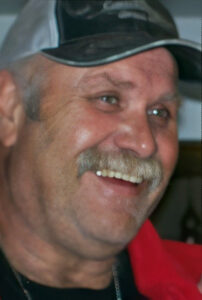
 followed by 24 hours off. Then they had three days on swing shift followed by 24 hours off, and finally three days on night shift followed by 24 hours off. It gave them time to have some R and R every few days. The two weeks for leave were the normal 14 days. LJ was honorably discharged from the Army in 1971. His training would help him in his career as a Deputy Sheriff in Casper, Wyoming. I would like to thank my brother-in-law, LJ Cook for his service to his country. Today is LJ’s birthday. Happy birthday LJ!! Have a great day!! We love you!!
followed by 24 hours off. Then they had three days on swing shift followed by 24 hours off, and finally three days on night shift followed by 24 hours off. It gave them time to have some R and R every few days. The two weeks for leave were the normal 14 days. LJ was honorably discharged from the Army in 1971. His training would help him in his career as a Deputy Sheriff in Casper, Wyoming. I would like to thank my brother-in-law, LJ Cook for his service to his country. Today is LJ’s birthday. Happy birthday LJ!! Have a great day!! We love you!!
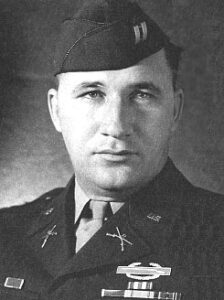 Captain Leonard Treherne “Max” Schroeder Jr looked out over the choppy water between the landing craft he was on and the shores of their destination…the beaches of Normandy, France. The beaches had been given code names, to protect the mission…Utah, Omaha, Gold, Juno, and Sword; the operation was code named Overlord. The beach ahead of Schroeder had been code named Utah. Along the hills behind the beach were many German bunkers, with armed German snipers hiding inside of them. Schroeder knew they were just waiting for them to step onto the beach before the snipers would open fire.
Captain Leonard Treherne “Max” Schroeder Jr looked out over the choppy water between the landing craft he was on and the shores of their destination…the beaches of Normandy, France. The beaches had been given code names, to protect the mission…Utah, Omaha, Gold, Juno, and Sword; the operation was code named Overlord. The beach ahead of Schroeder had been code named Utah. Along the hills behind the beach were many German bunkers, with armed German snipers hiding inside of them. Schroeder knew they were just waiting for them to step onto the beach before the snipers would open fire.
Schroeder was about to find out firsthand, just how bad this day was going to be. In fact, he was the first American soldier whose feet hit the sand on the beach at Normandy on D-Day…so, while his men were right behind him, he would experience this horrific battle at its inception. I have wondered just how they knew that he was first amid all that chaos, but it is a documented fact. Operation Overlord was pivotal in the United States’ overall success, but it was also extremely bloody, with great loss of life. While every life lost was horrific, the men who stormed the beaches of Normandy that day were willing to give their lives for a 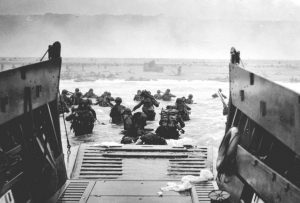 cause that they felt was essential…and I have so much respect for each and every one of them. Captain Schroeder led his team of men onto the beach…along with thousands of others…and managed to get them to their secured location. Nevertheless, during the mission, he was shot twice by German snipers. Once the mission was accomplished and his men were where they needed to be, Captain Schroeder passed out from his injuries.
cause that they felt was essential…and I have so much respect for each and every one of them. Captain Schroeder led his team of men onto the beach…along with thousands of others…and managed to get them to their secured location. Nevertheless, during the mission, he was shot twice by German snipers. Once the mission was accomplished and his men were where they needed to be, Captain Schroeder passed out from his injuries.
Schroeder woke up at an aid station on the beach, with medics taking care of his wounds so he could be transported to an army hospital in England. While in England, he recovered and had a lot of time to read all about his role in the successful mission…in many papers. I don’t know if he realized that his had been such a pivotal role in the battle, but it had. At the time, I doubt if he thought he would ever see that beach again, but in 1994, Schroeder revisited the beach at Normandy as a guest of the French 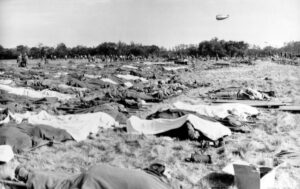 government. It was an amazing ceremony to pay homage to his heroic efforts that helped turn the tide for the Allies in World War II. It was an honor he had given no thought to as he looked out at that beach on that long ago June 6, 1944…but, an honor that he had earned along with all the other men who fought, and the many who had died. I’m sure those who gave all, were thankful that some made it home and managed to live a long life of liberty. Captain Leonard “Max” Schroeder, who was born on July 16, 1918, in Linthicum Heights, Maryland, passed away from emphysema early on the morning of May 26, 2009, in Largo, Florida at the age of 90.
government. It was an amazing ceremony to pay homage to his heroic efforts that helped turn the tide for the Allies in World War II. It was an honor he had given no thought to as he looked out at that beach on that long ago June 6, 1944…but, an honor that he had earned along with all the other men who fought, and the many who had died. I’m sure those who gave all, were thankful that some made it home and managed to live a long life of liberty. Captain Leonard “Max” Schroeder, who was born on July 16, 1918, in Linthicum Heights, Maryland, passed away from emphysema early on the morning of May 26, 2009, in Largo, Florida at the age of 90.
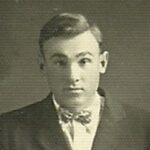
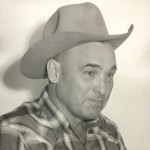 When my husband, Bob’s grandfather, Andy Schulenberg was a boy of 14 years, he was involved in a hunting accident, in which his leg was injured. Things were different in those days, and medicine just wasn’t as advanced as it is now. Not that medicine was antiquated in 1920, but much has been learned about how to save limbs since those days. Grandpa’s leg did not fare well, and after fighting infections, most likely gangrene, and losing the battle, it became apparent that if they were to save his life, they would have to sacrifice the leg.
When my husband, Bob’s grandfather, Andy Schulenberg was a boy of 14 years, he was involved in a hunting accident, in which his leg was injured. Things were different in those days, and medicine just wasn’t as advanced as it is now. Not that medicine was antiquated in 1920, but much has been learned about how to save limbs since those days. Grandpa’s leg did not fare well, and after fighting infections, most likely gangrene, and losing the battle, it became apparent that if they were to save his life, they would have to sacrifice the leg.
Following the accident and with the amputation, Grandpa send 14 months in the hospital. Now that’s a long time for anyone, but for a 14-year-old boy, that must have felt like an eternity. He missed a year of school, as well as all the fun things kids that age were doing. He also missed helping his parents with various chores, something which might not seem to be a negative thing, but when boredom sets in, a person would far rather work on the farm than lay in a bed. While inventors had dabbled 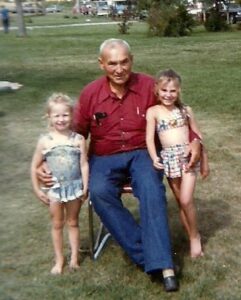
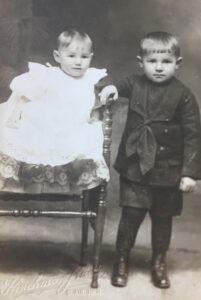 with the invention of the television, it was by no means perfected, and so he basically had the visitors who came in and books for entertainment. Not much fun really, especially since a lot of boys aren’t terribly interested in reading. Thankfully for Grandpa, his family tried to rally around him, and he received a number of postcard letters during that time. I would imagine he lived for the mail delivery, hoping he got a letter, after which he devoured the words on the page, even if the writer didn’t always pick their words very carefully. It was his connection to the outside world.
with the invention of the television, it was by no means perfected, and so he basically had the visitors who came in and books for entertainment. Not much fun really, especially since a lot of boys aren’t terribly interested in reading. Thankfully for Grandpa, his family tried to rally around him, and he received a number of postcard letters during that time. I would imagine he lived for the mail delivery, hoping he got a letter, after which he devoured the words on the page, even if the writer didn’t always pick their words very carefully. It was his connection to the outside world.
Grandpa was fitted with a wooden peg leg, but it would still be a long road learning to walk with it. I never knew exactly how high the leg went, but I believe it was probably mid-thigh. It was during this time that Grandpa would show his true fortitude He could have laid in that bed, giving up and letting other people take care of him, but he didn’t do that. He got up and worked hard to recover his mobility. Sure, he knew that things would never be the same, but he had things he wanted to do, and he was determined not to let this take him out of commission.
He went on to become the Sheriff of Rosebud County. One might think that he would never want anything to do with guns again, but while he didn’t really see the need for them much as sheriff, he was still well able to use 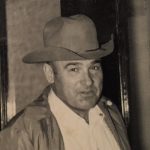
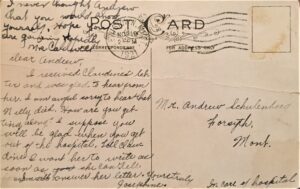 them. He was sheriff between 1955 and 1972, and during that time, he was well known as “the sheriff without a gun.” It’s hard to imagine a sheriff who has a reputation big enough to be able to work without a gun, including making arrests, but that was what he did. I don’t know if guns bothered him or not, but if so, he was quite successful at hiding it. Today is the 116th anniversary of Grandpa’s birth. Happy birthday in Heaven, Grandpa Schulenberg!! We love and miss you very much.
them. He was sheriff between 1955 and 1972, and during that time, he was well known as “the sheriff without a gun.” It’s hard to imagine a sheriff who has a reputation big enough to be able to work without a gun, including making arrests, but that was what he did. I don’t know if guns bothered him or not, but if so, he was quite successful at hiding it. Today is the 116th anniversary of Grandpa’s birth. Happy birthday in Heaven, Grandpa Schulenberg!! We love and miss you very much.
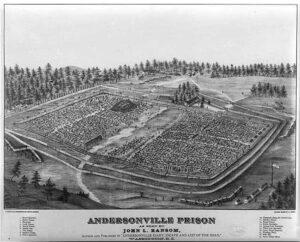
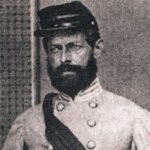 Andersonville POW camp was a Civil War era POW camp that was heavily fortified. It was run by Captain Henry Wirz, who was tried by a military tribunal on charges of war crimes when the war was over. The trial was presided over by Union General Lew Wallace and featured chief Judge Advocate General (JAG) prosecutor Norton Parker Chipman. The prison is located near Andersonville, Georgia, and today is a national historic site that is also known as Camp Sumpter. To me, its design had a somewhat unusual layout in that it had what is called a “Dead Line”. Some people might know what that is, but any prisoner who dared to tough it, much less try to cross it, found out very quickly what it was, because they were shot instantly…no questions asked. For that reason, prisoners rarely escaped from Andersonville Prison. The “dead line” was set up by the Confederate forces guarding the prison, to assist in prisoner control. The prison operated between February 25, 1864, and May 9, 1864. During that time, a total of 4,588 patients visited the Andersonville prison hospital, and 1,026 never left there alive.
Andersonville POW camp was a Civil War era POW camp that was heavily fortified. It was run by Captain Henry Wirz, who was tried by a military tribunal on charges of war crimes when the war was over. The trial was presided over by Union General Lew Wallace and featured chief Judge Advocate General (JAG) prosecutor Norton Parker Chipman. The prison is located near Andersonville, Georgia, and today is a national historic site that is also known as Camp Sumpter. To me, its design had a somewhat unusual layout in that it had what is called a “Dead Line”. Some people might know what that is, but any prisoner who dared to tough it, much less try to cross it, found out very quickly what it was, because they were shot instantly…no questions asked. For that reason, prisoners rarely escaped from Andersonville Prison. The “dead line” was set up by the Confederate forces guarding the prison, to assist in prisoner control. The prison operated between February 25, 1864, and May 9, 1864. During that time, a total of 4,588 patients visited the Andersonville prison hospital, and 1,026 never left there alive.
According to former prisoner, enlisted soldier John Levi Maile, “It consisted of a narrow strip of board nailed to a row of stakes, about four feet high.” The “dead line” completely encircled Andersonville. Soldiers were told to “shoot any prisoner who touches the ‘dead line'” “It was the standing order to the guards,” Maile explained. “A sick prisoner inadvertently placing his hand on the “dead line” for support… or anyone touching it with suicidal intent, would be instantly shot at, the scattering balls usually striking other than the one aimed at.” It was a risk the prisoners took if they chose to be anywhere near the “dead line” at all. Prisoner Prescott Tracy worked as a clerk in the Andersonville hospital. He said, “I have seen one hundred and fifty bodies waiting passage to the “dead house,” to be buried with those who died in hospital. The average of deaths through the earlier months was thirty a day; at the time I left, the average was over one hundred and thirty, and one day the record showed one hundred and forty-six.” The major threats in the prison camp were diarrhea, dysentery, and scurvy.
A sergeant major in the 16th Regiment Connecticut Volunteers, Robert H. Kellogg what he saw when he entered the camp as a prisoner on May 2, 1864, “As we entered the place, a spectacle met our eyes that almost froze our blood with horror, and made our hearts fail within us. Before us were forms that had once been active and erect…stalwart men, now nothing but mere walking skeletons, covered with filth and vermin. Many of our men, in the heat and intensity of their feeling, exclaimed with earnestness. “Can this be hell?” “God protect us!” and all thought that he alone could bring them out alive from so terrible a place. In the center of the whole was a swamp, occupying about three or four acres of the narrowed limits, and a part of this marshy place had been used by the prisoners as a sink, and excrement covered the ground, the scent arising from which was suffocating. The ground allotted to our ninety was near the edge of this plague-spot, and how we were to live through the warm summer weather in the midst of such fearful surroundings, was more than we cared to think of just then.”
After hearing the accounts of men who had the misfortune of being incarcerated in this horrific POW camp, I 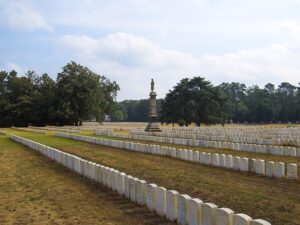
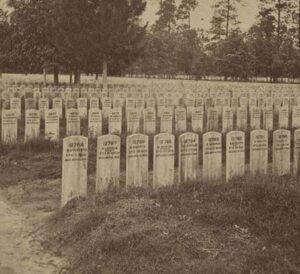 wondered if there might have been some changes had the camp been run in more modern times. Of course, there is no guarantee of that, since there has been mistreatment of prisoners-of-war in all wars, and the treatment ultimately falls on the people running the camp and the soldiers monitoring the prisoners. It is, however, a sad state of affairs when prisoners are starved, beaten, frozen, and otherwise mistreated in these camps. The point is to hold them, not murder them.
wondered if there might have been some changes had the camp been run in more modern times. Of course, there is no guarantee of that, since there has been mistreatment of prisoners-of-war in all wars, and the treatment ultimately falls on the people running the camp and the soldiers monitoring the prisoners. It is, however, a sad state of affairs when prisoners are starved, beaten, frozen, and otherwise mistreated in these camps. The point is to hold them, not murder them.
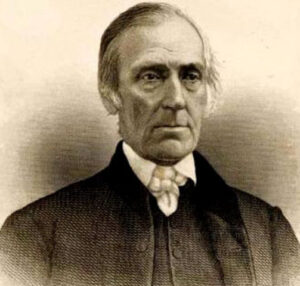
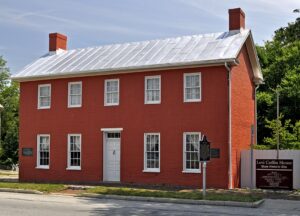 In any kind of slavery situation, there are always people who are willing to help those who are being held against their will. Just like during the Holocaust, when the slaves were in trouble, people came to their rescue by forming the Underground Railroad. One hero of the Underground Railroad was Levi Coffin. In the winter of 1826-1827, fugitives began to come show up at the Coffin house. It started out as a well-kept secret and just a few slaves came, but the numbers increased as it became more widely known on different routes. These slaves were running away from bondage, beatings, and limitless working hours. Their lives were little better than death, and they knew they had to escape or die.
In any kind of slavery situation, there are always people who are willing to help those who are being held against their will. Just like during the Holocaust, when the slaves were in trouble, people came to their rescue by forming the Underground Railroad. One hero of the Underground Railroad was Levi Coffin. In the winter of 1826-1827, fugitives began to come show up at the Coffin house. It started out as a well-kept secret and just a few slaves came, but the numbers increased as it became more widely known on different routes. These slaves were running away from bondage, beatings, and limitless working hours. Their lives were little better than death, and they knew they had to escape or die.
When they arrived at the Coffin house, they were welcomed in and given shelter, they would usually sleep during the day, and then they were quickly forwarded safely on their journey. Neighbors who had been too fearful of the penalty of the law to help at first, saw how well the Underground Railroad was being run and soon they felt encouraged to help. A big part of the change of attitude came from the fearless manner in which Levi Coffin acted and the success his efforts produced. The neighbors began to contribute clothing the fugitives and aid in forwarding them on their way. They were still too afraid to shelter them under their own roof, so that part of the work fell to the Coffin household. There were the “content to watch” people, who obviously wanted to see the work go on…as long as someone else took the risk. And of course, there were those who told Levin Coffin he was wasting his time. They tried to discourage him and dissuade him from running such risks, telling him that they were greatly concerned for my safety and monetary interests. They tried to convince him that continuing this risky business could damage his business and possibly even ruin him. The told him he could be 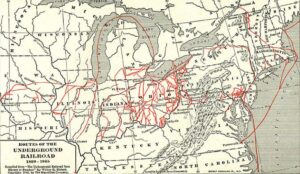 endangering himself and his family too. I suppose it could have, because there are always those who sympathized with the slave-owners, but Levi Coffin could not stand to see the horrible treatment the slaves endured. He had to do something, no matter what it cost him, just like those who helped the Jews during the Holocaust.
endangering himself and his family too. I suppose it could have, because there are always those who sympathized with the slave-owners, but Levi Coffin could not stand to see the horrible treatment the slaves endured. He had to do something, no matter what it cost him, just like those who helped the Jews during the Holocaust.
Levi listened to these “counselors” and then told them that he “felt no condemnation for anything that I had ever done for the fugitive slaves. If, by doing my duty and endeavoring to fulfill the injunctions of the Bible, I injured my business, then let my business go. As to my safety, my life was in the hands of my Divine Master, and I felt that I had his approval. I had no fear of the danger that seemed to threaten my life or my business. If I was faithful to duty and honest and industrious, I felt that I would be preserved and that I could make enough to support my family.”
Even some of those people who were opposed to slavery, felt it was very wrong to harbor fugitive slaves. They figured that the slaves must be guilty of some crime, such as possibly killing their masters or committed some other crime in their escape attempts…making those who helped them an accomplice to the “crime” they were supposedly guilt of. Oh, they had every imaginable objection, and figured it was, at the very least, their duty to make their thoughts known. Once they had voiced their objections, their conscience was clear, and if Levi met with a tragic end, they could at least say, “I told him!!” Levi, in return asked one such “neighbor’s keeper” neighbor, if he thought the Good Samaritan stopped to inquire whether the man who fell among thieves was guilty of any crime before he attempted to help him? He said, “I asked him if he were to see a stranger who had fallen into the ditch would he not help him out until satisfied that he had committed no atrocious deed?” I suppose it was a “crime” to escape their masters, but then some laws should not be laws, and slavery certainly falls into that category. Levi Coffin had to follow his spirit and do what he felt God would expect of him, and in 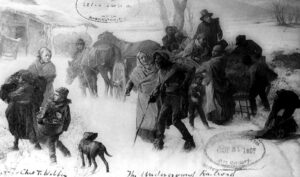 the end, he saved many lives.
the end, he saved many lives.
Many of Levi’s pro-slavery customers left him for a time, and sales were down. For while his business struggled, but Levi knew that he was doing God’s will, and so God would take care of him and his business. Before long, new customers replaced those who had left him. New settlements were rapidly forming to the north and Levi’s own was filling up with emigrants from North Carolina and other States. His trade increased and his business grew. He says of this time in his life, “I was blessed in all my efforts and succeeded beyond my expectations.”
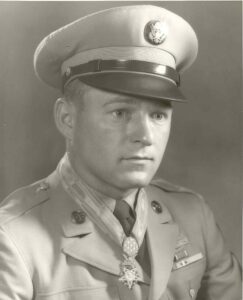 What makes a Medal of Honor winner? I don’t mean what act actually earns them the medal, but rather what causes them to get to that point and beyond. The Medal of Honor is the United States government’s highest and most prestigious military decoration that may be awarded to recognize American soldiers, sailors, marines, airmen, Space Force guardians, and coast guardsmen who have distinguished themselves by acts of valor…or great courage in the face of danger, especially in battle. I seriously doubt if the winner gave any thought to what he had to do to win the medal…there is just no time, and people don’t perform heroic acts just for the medal. It’s bigger than that.
What makes a Medal of Honor winner? I don’t mean what act actually earns them the medal, but rather what causes them to get to that point and beyond. The Medal of Honor is the United States government’s highest and most prestigious military decoration that may be awarded to recognize American soldiers, sailors, marines, airmen, Space Force guardians, and coast guardsmen who have distinguished themselves by acts of valor…or great courage in the face of danger, especially in battle. I seriously doubt if the winner gave any thought to what he had to do to win the medal…there is just no time, and people don’t perform heroic acts just for the medal. It’s bigger than that.
One man, Corporal Ronald Rosser, earned his Medal of Honor while serving in the 38th Regiment of the 2nd Infantry Division during the Korean War. Rosser enlisted in Army at the age of 17 and served from 1946 until 1949. His tour was finished, and he went home, but then his younger brother was killed in Korea in February of 1951. Rosser was devastated, but instead of wallowing in grief, he chose to honor his brother. Rosser re-enlisted to “finish his [brother’s] tour” of duty. Revenge was the only thing he could do for his brother now, and Rosser wanted revenge. In January of 1952, Rosser was a part of the regiment’s L Company. L Company was dispatched to capture an enemy-occupied hill. The battle there was fierce and enemy resistance caused heavy casualties. L Company was reduced to just 35 men from the initial 170 sent out, but they were ordered to make one more 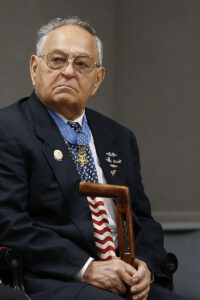 attempt to take the hill. Orders are orders, and as I said, the men didn’t really have time to think about how they could prove their courage. Rosser rallied the remaining men and charged the hill. Enemy fire continued to be heavy, but Rosser attacked the enemy position three times, killing 13 enemy soldiers, and although wounded himself, carried several men to safety. It truly was a courageous act, and one worthy of the Medal of Honor, but not one that Rosser had planned in any way. He just knew that he needed to save as many lives as he could, because he couldn’t live with himself if he didn’t. On June 27, 1952, Rosser was awarded the Medal of Honor by President Harry Truman at the White House for his heroism. On September 20, 1966, another of Rosser’s brothers, PFC Gary Edward Rosser, USMC, was killed in action, this time in the Vietnam War. Rosser requested a combat assignment in Vietnam but was rejected and subsequently retired from the army soon after. Rosser married Sandra Kay (nee Smith) Rosser who died November 28, 2014. He was the father of Pamela (nee Rosser) Lovell. Rosser died on August 26, 2020, in Bumpus Mills, Tennessee at the age of 90.
attempt to take the hill. Orders are orders, and as I said, the men didn’t really have time to think about how they could prove their courage. Rosser rallied the remaining men and charged the hill. Enemy fire continued to be heavy, but Rosser attacked the enemy position three times, killing 13 enemy soldiers, and although wounded himself, carried several men to safety. It truly was a courageous act, and one worthy of the Medal of Honor, but not one that Rosser had planned in any way. He just knew that he needed to save as many lives as he could, because he couldn’t live with himself if he didn’t. On June 27, 1952, Rosser was awarded the Medal of Honor by President Harry Truman at the White House for his heroism. On September 20, 1966, another of Rosser’s brothers, PFC Gary Edward Rosser, USMC, was killed in action, this time in the Vietnam War. Rosser requested a combat assignment in Vietnam but was rejected and subsequently retired from the army soon after. Rosser married Sandra Kay (nee Smith) Rosser who died November 28, 2014. He was the father of Pamela (nee Rosser) Lovell. Rosser died on August 26, 2020, in Bumpus Mills, Tennessee at the age of 90.

